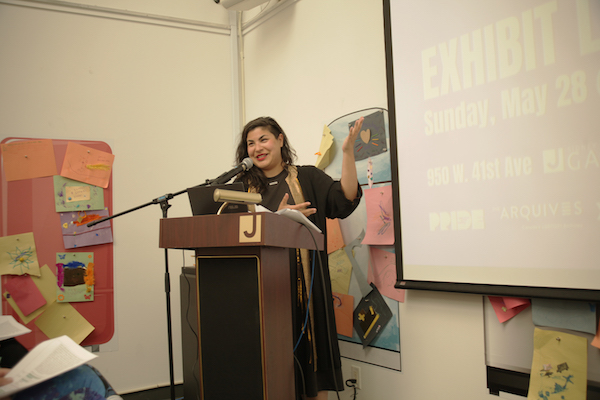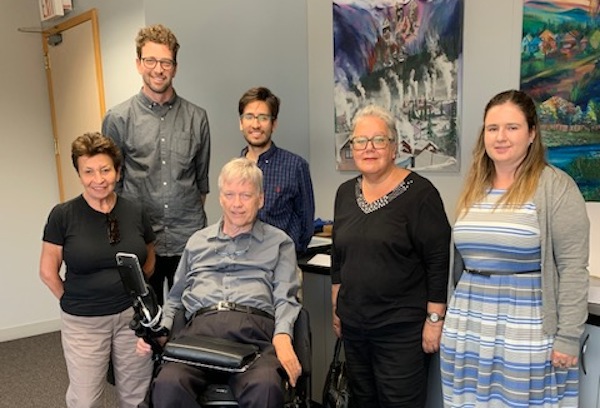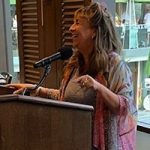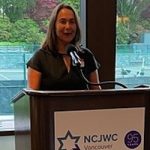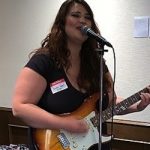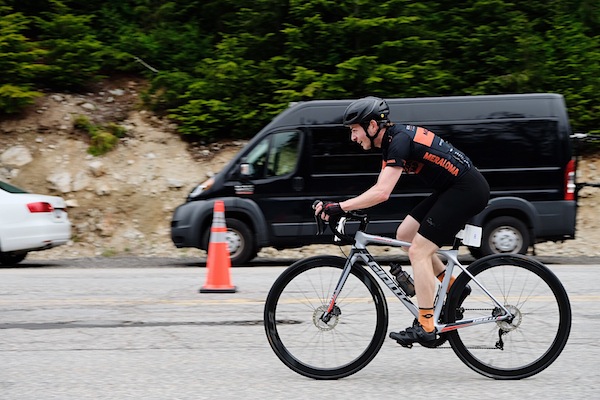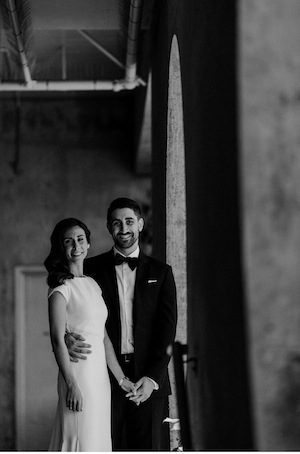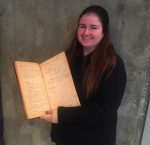Carmel Tanaka, JQT Vancouver executive director, speaks at the May 28 launch of the B.C. Jewish Queer &Trans Oral History Project online exhibit. (photo by Brianne Nord-Stewart)
The B.C. Jewish Queer &Trans Oral History Project online exhibit went live amid the cheers of those gathered in the standing-room-only Zack Gallery May 28.
With a total of 38 interviews, the project is “one of, if not the, largest Jewish LGBTQ archives in the world,” said Carmel Tanaka, JQT Vancouver executive director, after she guided attendees – both online and in-person – through the website, jqtvancouver.ca/jqt-oral-history-bc.
The project had its beginning in 2019, when Tanaka approached the Jewish Museum and Archives of British Columbia (JMABC) asking if there was any queer and trans content in the archives. When the answer was no, JMABC and JQT Vancouver joined as partners to train volunteers in interview procedures, identify and connect with interviewees and record the stories of Jewish queer and trans elders throughout the province.
Alysa Routtenberg, archivist at JMABC, shared with the Independent how the collection of oral histories, proceeded. “We approached our funding partners, to fund the training of 13 volunteer interviewers in best practices and how to ensure consent from the interviewees, as the information would be archived and accessible to all, with each contributor identified and ‘out’ as Jewish and LGBTQ. The energy of Carmel Tanaka positively influenced the framing of the interview questions and our understanding of the Jewish queer community and ensured the inclusion of all willing community members in the oral history archives,” she said, welcoming the volunteers who were trained to participate in other oral history projects with the JMABC.
The target group for the B.C. Jewish Queer & Trans Oral History Project was identified as Jewish, trans and queer and age 65 years and older. The intention was to gather interviewees’ lived experiences in community as Jewish and LGBTQ. It was an intergenerational effort, with many of the interviewers being younger than the storytellers. When the pandemic hit, the interviews moved onto Zoom accounts already in place with the museum, and everyone learned new technical skills and continued collecting the stories. Funding for the project was provided by the Jewish Community Foundation, Isaac and Sophie Waldman Endowment Fund, Live Educate Transform Society, and the Vancouver Heritage Foundation’s Yosef Wosk Publication Fund, along with private donors.
The B.C. Jewish Queer &Trans Oral History Project was a catalyst for two other JQT initiatives: Twice Blessed 2.0 and The B.C. Jewish Queer and Trans Seniors Resource Guide.
When Tanaka interviewed Jacqueline Walters for the oral history project, Walters shared that she had conducted a community needs assessment in 2004 while working in the counseling department of what was then called the Jewish Family Services Agency (and is now just Jewish Family Services). Walters had kept a copy of the full report and offered it to Tanaka. Thus, the Twice Blessed 2.0 project took flight. A new needs assessment took place and data points were compared to get a sense of what has and hasn’t changed in the past two decades. Twice Blessed 2.0 – with its 13 calls for community action – is available on JQT’s website. Walters flew in from Salt Spring Island to be at the launch.
“Also, during these interviews,” said Tanaka at the event, “we began to hear firsthand the fears of our community members when it comes to aging, particularly homophobia, transphobia and antisemitism upon entering assisted living and long-term care. This led to the creation of the JQT Seniors Initiative, a community response network, and this initiative just released a seniors resource guide, basically a report card on what you can and cannot prepare for as you get older in the Jewish community, in the LGBTQ community, and in the healthcare system in B.C. in 2023.” The guide is also available on JQT’s website.
With the formal JMABC interviews completed, the online exhibit was the next step undertaken by JQT, with Tanaka as project coordinator, and a team of volunteers. “I am thankful for the wisdom and resilience of everyone involved with this project,” Tanaka told the Independent.
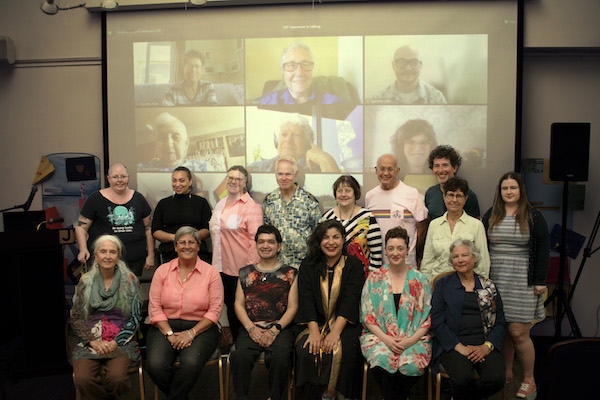
The online exhibit features an interactive timeline of B.C. Jewish queer and trans activity from the 1920s to 2020s; an essay weaving together the stories that emerged from the interviews; an article on the Klezbians music group; video excerpts from the oral history interviews; interviewee statistics; and more. Three of the interviewees spoke with the Independent.
Syd Lapan lives in Comox and was “absolutely” enthusiastic about being included. Lapan said she has been out since 1971. Living in the United States at the time, she said she was, as a lesbian, considered illegal and insane. She was active in the women’s liberation movement, then in the gay rights movement in Colorado. Excited about JQT’s oral history project from the beginning, she was glad to share her story, to have it noted, and she joined the launch via the Facebook livestream. When she saw the video on the oral history site of herself being interviewed, she confessed that she cried a bit, finding it emotionally striking. She was thankful for the care Tanaka displayed while interviewing her.
Ira Rogers attended the launch, but, unlike Lapan, he was not initially keen about being included in the project – Tanaka’s enthusiasm won him over, he remarked. Rogers said he felt good sharing his story, he liked going back to earlier chapters of his life. He grew up in New York and moved to Nashville, Tenn., to pursue a career in songwriting – among other things, he contributed to a Grammy-nominated Reba McEntire album, helping create the songs “All Dressed Up (With Nowhere To Go)” and “For My Broken Heart.” Even with such successes, living in Tennessee became too much, though, and Rogers set out to find a gay-friendly city, eventually relocating to Vancouver. Rogers currently is associated with the Vancouver Men’s Chorus.
Finally, Marc Gelmon, who transitioned at age 19, discovered JQT while searching online for information related to his work at TransCareBC. He made a note to himself and got on with life. When contacted to participate in the oral history, he was interested right from the start. “I’m a Vancouverite, I’ve lived my adult life as a trans person. I love telling my story, as it is always cathartic for me,” he said. “I hope it is also cathartic for others.” At the time of his interview with the Independent, Gelmon had not seen his oral history interview online, as he was traveling in the United Kingdom.
In addition to Tanaka and Routtenberg, also speaking at the May 8 launch were emcees Aviva Rathbone, chair of JQT, and Sophie Macdonald, JQT vice-chair. Mack Paul of Musqueam First Nation gave the land acknowledgement. Alison Cristall, assistant executive director of the Jewish Community Centre of Greater Vancouver, shared a few words, as did Allison Dunne, co-executive director of Vancouver Pride Society. Carol Herbert, past chair of the JMABC, spoke and Raegan Swanson, archivist and executive director or the ArQuives: Canada’s LGBTQ2S+ Archives, joined the proceedings virtually, from Toronto. JQT ethnographer Maxa Sawyer, speaking from Winnipeg, closed out the proceedings.
To view the JMABC oral history collection catalogue, including all the interviews conducted for this project, go to archives.jewishmuseum.ca and enter JQT or the name of the interviewee. To access any of the full interviews, contact the museum at [email protected] or 604-257-5199. Go to jqtvancouver.ca to view the online exhibit, a video of the launch event and learn more about JQT.
Trude LaBossiere Huebner is a Vancouver freelance writer.

